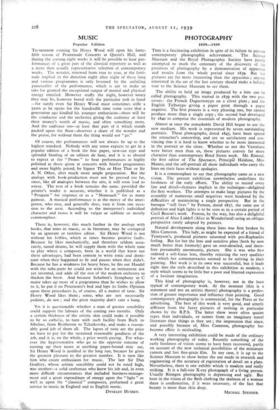MUSIC
Popular Edition
TO-MORROW evening Sir Henry Wood will open his forty- fifth season of Promenade Concerts at Queen's Hall, and during the coming eight weeks it will be possible to hear per- formances of a great part of the classical repertory as well as a more than usually representative selection of contemporary works. The wonder, renewed from year to year, at the forti- tude implied in the direction night after night of these long and various programmes is only lessened by the unfailing punctuality of the performance, which is apt to make us take for granted the exceptional output of mental and physical energy entailed. However stuffy the night, however weary they may be, however bored with the particular task in hand —for surely even Sir Henry Wood must sometimes stifle a yawn as he opens for the hundredth time some score that a generation ago kindled his younger enthusiasm—there will be the conductor and the orchestra giving the audience at least their money's worth of music, and often something more. And the audience too—at least that part of it which stands packed upon the floor—deserves a share of the wonder and the praise, for without them the thing would not "go."
Of course, the performances will not always be up to the highest standard. Nobody with any sense expects to get in a popular edition of a book the fine paper, new-cut type and splendid binding of an edition de luxe, and it is as absurd to expect at the " Proms " to hear performances as highly polished as those given at concerts with briefer programmes and more highly priced, by Signor This or Herr That or Sir A. N. Other, after much more ample preparation. But the analogy with book-production must not be pressed too far, since, like all analogies between the arts, it will soon lead us astray. The text of a book remains the same, provided the printer's reader is accurate, whether it is published as a " Penguin " for sixpence or as a " Nonesuch " for as many guineas. A musical performance is at the mercy of the inter- preter, who may, and generally does, vary it from one occa- sion to the next. According to the interpreter's individual character and tastes it will be vulgar or sublime or merely commonplace.
There is, however, this much further in the analogy with books, that texts in music, as in literature, may be corrupted by an ignorant or tasteless editor. Sir Henry Wood is not without his foibles, which at times become positive faults. Because he likes mechanically, and therefore seldom accu- rately, tuned drums, he will supply them with the whole tune to play where a composer, born in a world that knew not these advantages, had been content to write tonic and domi- nant when they happened to fit and pauses when they didn't. Because he has a weakness for heavy brass, he fits out Handel with the tuba-parts he could not write for an instrument not yet invented, and adds all the rest of the modern orchestra to thicken the brew. And because Schubert's Symphony in C major takes up more of a programme than he wishes to allow to it, he put it on Procrustes's bed and lops its limbs. Opinion upon these procedures is, of course, all a matter of taste. Sir Henry Wood likes them ; some, who are not necessarily pedants, do not ; and the great majority don't care a hang.
Yet it is questionable whether a man of greater sensibility could support the labours of the coming two months. Only a certain thickness of the artistic skin could make it possible to be so catholic, to turn with such facility from Bach to Sibelius, from Beethoven to Tchaikovsky, and make a reason- ably good job of them all. The lapses of taste are the price we have to pay for the sustained reasonable goodness of the job, and it is, on the whole, a price worth paying. For what- ever the hypersensitive who go to the opposite extreme of turning up their noses at anything paper-bound may say, Sir Henry Wood is justified in the long run, because he gives the greatest pleasure to the greatest number. It is men like him who create enthusiasm for music. The late Sir Dan Godfrey, whose artistic sensibility could not be rated high, was another—a solid craftsman who knew his job and, in even more difficult circumstances that included business-manage- ment and a great expenditure of energy upon the " light " as well as upon the " classical " composers, performed a great service to music in England and to English music.
DYNELEY HUSSEY.








































 Previous page
Previous page